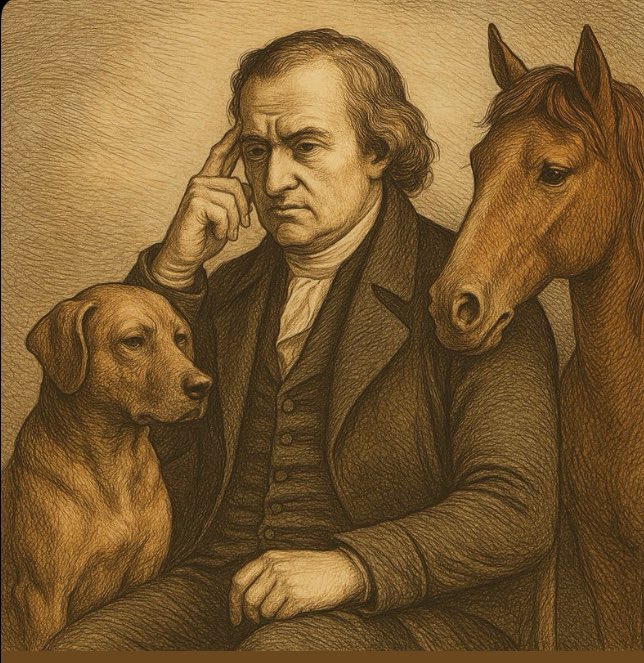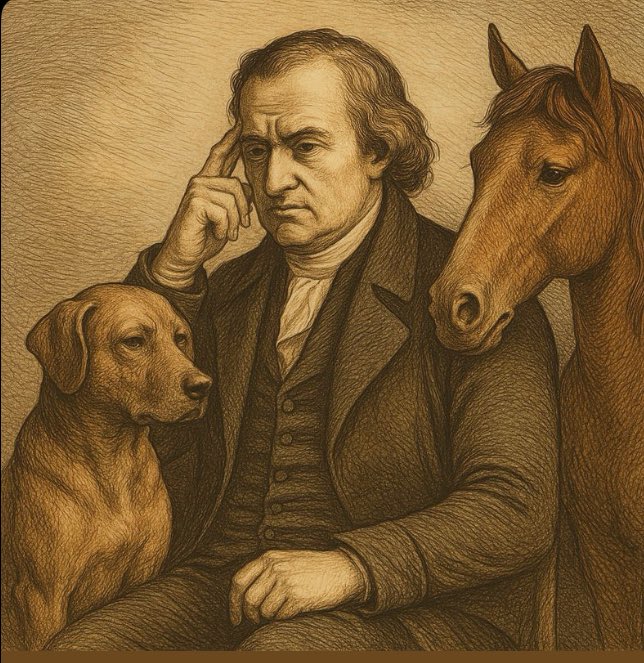🧵Competing Christian Interpretations of Rights
Catholic Scholasticism:
Rights are grounded in natural law as participation in the eternal law. Inalienable rights flow from objective human nature as rational creatures ordered to God. Catholic political theology, however, often tied rights to hierarchical mediation (Church and State as dispensers). While America retained this ontological grounding of natural law as participation in the eternal law, it explicitly rejected Catholic political theology and hierarchical mediation of rights - for very specific reasons!!
Protestant Puritan / Theonomic Line:
Rights are not inalienable in the strict sense; they are conditional privileges granted or withdrawn based on covenant obedience. Authority rests in the covenant community (civil and ecclesial), not in the people as individuals. This is the foundation of the ‘Principle of Superiority’ whereby rulers mediate God’s will and people obey. There’s a relationship here to note between Pufendorf’s Principle of Superiority in English Law, upheld by Blackstone, which Founder James Wilson outright rejected due to its incompatibility with American Popular Sovereignty and Self Governance. This is why the UK and Europe, under the Legal Principle of (State) Supremacy, can not fight back against their authoritarian governments in the same way that America can defend itself - IF - its Natural Law origins are understood and enacted. Currently there appears to be much opposition to Americans understanding this, from many vested in a Post Constitutional America.
Catholic Scholasticism:
Rights are grounded in natural law as participation in the eternal law. Inalienable rights flow from objective human nature as rational creatures ordered to God. Catholic political theology, however, often tied rights to hierarchical mediation (Church and State as dispensers). While America retained this ontological grounding of natural law as participation in the eternal law, it explicitly rejected Catholic political theology and hierarchical mediation of rights - for very specific reasons!!
Protestant Puritan / Theonomic Line:
Rights are not inalienable in the strict sense; they are conditional privileges granted or withdrawn based on covenant obedience. Authority rests in the covenant community (civil and ecclesial), not in the people as individuals. This is the foundation of the ‘Principle of Superiority’ whereby rulers mediate God’s will and people obey. There’s a relationship here to note between Pufendorf’s Principle of Superiority in English Law, upheld by Blackstone, which Founder James Wilson outright rejected due to its incompatibility with American Popular Sovereignty and Self Governance. This is why the UK and Europe, under the Legal Principle of (State) Supremacy, can not fight back against their authoritarian governments in the same way that America can defend itself - IF - its Natural Law origins are understood and enacted. Currently there appears to be much opposition to Americans understanding this, from many vested in a Post Constitutional America.
2/ Continental Enlightenment (Pufendorf, Locke, Hobbes):
Rights are redefined as will or consent. They are no longer tied to final cause or natural law but to contractual arrangements. Inalienable becomes pragmatic shorthand for what cannot be ‘safely’ given up. This is not the grounding of the Declaration.
Scottish Common Sense Realism (Witherspoon, Madison, Adams, Wilson):
Rights are self-evident truths discernible by right reason, grounded in human nature as created by God. They are not permissions, not contracts and not church-mediated. Rights are inalienable precisely because they arise from the essence of man as rational, moral, accountable being (as defined ontologically in Genesis and upheld by St Paul) which no ruler or covenant can erase. Founding Father and Supreme Court Justice James Wilson brought this directly into the U.S. founding.
Rights are redefined as will or consent. They are no longer tied to final cause or natural law but to contractual arrangements. Inalienable becomes pragmatic shorthand for what cannot be ‘safely’ given up. This is not the grounding of the Declaration.
Scottish Common Sense Realism (Witherspoon, Madison, Adams, Wilson):
Rights are self-evident truths discernible by right reason, grounded in human nature as created by God. They are not permissions, not contracts and not church-mediated. Rights are inalienable precisely because they arise from the essence of man as rational, moral, accountable being (as defined ontologically in Genesis and upheld by St Paul) which no ruler or covenant can erase. Founding Father and Supreme Court Justice James Wilson brought this directly into the U.S. founding.
3/ So Which Interpretation is Correct for the Declaration & Constitution?
The Declaration explicitly states:
‘All men are created equal, endowed by their Creator with certain unalienable Rights…’
This matches only one lineage; the Common Sense Realist grounding. ‘Created equal’ refers to ontological grounding in human nature, not contractual or covenantal. ‘Endowed by their Creator’ means rights come directly from God to man as man, not via rulers, priests, or contracts. ‘Unalienable’ means these rights are inseparable from human essence (what man is, not what man does or what man has) and not subject to revocation. The Constitution then operationalizes this by vesting sovereignty in the People, not the State or the Church. James Wilson made this explicit:
‘Man is the workmanship of his all perfect Creator; and he is formed for a state of society, as well as for a state of individual existence. From his frame, from his faculties and from his affections, he is evidently destined for both.’ (Collected Works of James Wilson, vol. 1, p. 104).
This is not the Puritan/theonomic ‘conditional rights’ model. It is not the Enlightenment contractarian ‘consent-only’ model and it is not the hierarchical Catholic ‘mediated rights’ model.
The Declaration explicitly states:
‘All men are created equal, endowed by their Creator with certain unalienable Rights…’
This matches only one lineage; the Common Sense Realist grounding. ‘Created equal’ refers to ontological grounding in human nature, not contractual or covenantal. ‘Endowed by their Creator’ means rights come directly from God to man as man, not via rulers, priests, or contracts. ‘Unalienable’ means these rights are inseparable from human essence (what man is, not what man does or what man has) and not subject to revocation. The Constitution then operationalizes this by vesting sovereignty in the People, not the State or the Church. James Wilson made this explicit:
‘Man is the workmanship of his all perfect Creator; and he is formed for a state of society, as well as for a state of individual existence. From his frame, from his faculties and from his affections, he is evidently destined for both.’ (Collected Works of James Wilson, vol. 1, p. 104).
This is not the Puritan/theonomic ‘conditional rights’ model. It is not the Enlightenment contractarian ‘consent-only’ model and it is not the hierarchical Catholic ‘mediated rights’ model.
4/ Receipts
Declaration of Independence (1776):
Jefferson’s draft borrowed some of Locke’s phrasing but was conscientiously, explicitly revised by Congress specifically under the influence of Wilson and the Realist consensus to ‘unalienable’ (Locke wrote ‘inherent’ and ‘indefeasible’ differently).
James Wilson (1790s Lectures on Law) explicitly rejected Pufendorf/Blackstone’s voluntarist definition of law, in order to uphold and defend the following:
“The law of nature…flows from the frame and constitution of man, from his relations to his Creator and to his fellow-men. It is coeval with man, binding over all the globe, at all times, and upon all mankind.” (Works of James Wilson, vol. 1, p. 104).
“The right of liberty is the gift of God, not of man; and no man can have the right to deprive another of it.” - Thomas Reid (Essays on the Active Powers of Man, 1788)
Declaration of Independence (1776):
Jefferson’s draft borrowed some of Locke’s phrasing but was conscientiously, explicitly revised by Congress specifically under the influence of Wilson and the Realist consensus to ‘unalienable’ (Locke wrote ‘inherent’ and ‘indefeasible’ differently).
James Wilson (1790s Lectures on Law) explicitly rejected Pufendorf/Blackstone’s voluntarist definition of law, in order to uphold and defend the following:
“The law of nature…flows from the frame and constitution of man, from his relations to his Creator and to his fellow-men. It is coeval with man, binding over all the globe, at all times, and upon all mankind.” (Works of James Wilson, vol. 1, p. 104).
“The right of liberty is the gift of God, not of man; and no man can have the right to deprive another of it.” - Thomas Reid (Essays on the Active Powers of Man, 1788)
5/
Wilson’s Role at the Constitutional Convention is significant and crucial here. He rejected both state-sovereignty and covenantal supremacy. His doctrine of Popular Sovereignty tied directly to the Declaration’s anthropology. When I began learning about Reid and Wilson I had no idea how much resistance there would be to learning about this heritage. Now I understand. It is the only one which is the bulwark against a Post Constitutional America and a block to the aspirations of the rising factions competing for The One Ring. Factions which appear religiously, politically, culturally oppositional in so many ways - yet in foundational operation - all function to balkanize and to dissolve the Constitutional Republic. In many ways I’m glad I went into learning about this like the fool in complete ignorance. If I’d recognized and realized back then, what I was stepping into - I don’t think I would have had the courage or the will to remain committed to learning about this heritage amidst overwhelming animosity to it on the one hand and a pandemic of ignorance about it’s significance for Americans on the other. Not just for Americans though, but for all people or all nations seeking to ground ontological understanding in created nature and the defence against the dark (dialectical) arts which that brings. The only defence against ideological possession, the transhuman, post human enterprise, post national global tyranny and Technocracy. As Yuri Bezmenov stated, only America has the instrument with which to defend itself. Nowhere else in the world has this and Americans have had this understanding removed from their public awareness, through idea laundering in the academy and through epistemic capture of the Schooling system from its inception. So, as a parent and a teacher, this is why I want to see the American Constitutional Republic upheld and defended. The churches (particularly their leadership - rather than the faithful) have fallen to Statist co-option, the political parties were theatre and manipulation from the get go. The biblical foundations of the Declaration & Constitution (not discounting the Bill of Rights here either) are a rock, a shield and a sword in the face of sophist statist deception, even when dressed in clerical robes. In short - there is only one interpretation of inalienable rights that coheres with the Declaration & Constitution; the Wilson/Witherspoon/Madison Common Sense Realist grounding in natural law as Creator-endowed and ontologically inseparable from human nature.
Wilson’s Role at the Constitutional Convention is significant and crucial here. He rejected both state-sovereignty and covenantal supremacy. His doctrine of Popular Sovereignty tied directly to the Declaration’s anthropology. When I began learning about Reid and Wilson I had no idea how much resistance there would be to learning about this heritage. Now I understand. It is the only one which is the bulwark against a Post Constitutional America and a block to the aspirations of the rising factions competing for The One Ring. Factions which appear religiously, politically, culturally oppositional in so many ways - yet in foundational operation - all function to balkanize and to dissolve the Constitutional Republic. In many ways I’m glad I went into learning about this like the fool in complete ignorance. If I’d recognized and realized back then, what I was stepping into - I don’t think I would have had the courage or the will to remain committed to learning about this heritage amidst overwhelming animosity to it on the one hand and a pandemic of ignorance about it’s significance for Americans on the other. Not just for Americans though, but for all people or all nations seeking to ground ontological understanding in created nature and the defence against the dark (dialectical) arts which that brings. The only defence against ideological possession, the transhuman, post human enterprise, post national global tyranny and Technocracy. As Yuri Bezmenov stated, only America has the instrument with which to defend itself. Nowhere else in the world has this and Americans have had this understanding removed from their public awareness, through idea laundering in the academy and through epistemic capture of the Schooling system from its inception. So, as a parent and a teacher, this is why I want to see the American Constitutional Republic upheld and defended. The churches (particularly their leadership - rather than the faithful) have fallen to Statist co-option, the political parties were theatre and manipulation from the get go. The biblical foundations of the Declaration & Constitution (not discounting the Bill of Rights here either) are a rock, a shield and a sword in the face of sophist statist deception, even when dressed in clerical robes. In short - there is only one interpretation of inalienable rights that coheres with the Declaration & Constitution; the Wilson/Witherspoon/Madison Common Sense Realist grounding in natural law as Creator-endowed and ontologically inseparable from human nature.

• • •
Missing some Tweet in this thread? You can try to
force a refresh














